A Retrospective of the Civilization Board Games (Part One)
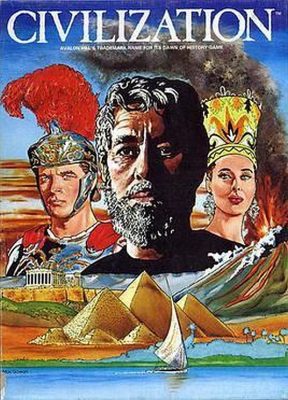
By Patrick S. Barker
Civilization: The Board Game (1980)
– The Game of the Heroic Age
The first Civilization board game was created by Francis Tresham, a former British Royal Air Force radio instructor. Tresham first thought of the idea for the game while browsing a historical atlas at his base library. The idea was further sparked by Tresham’s experience playing strategy games like Risk and Diplomacy. Tresham found playing Diplomacy to be rather averse and thought to design a game that stressed winning through cultural and technological progress rather than military force.
Tresham’s game begins with the appearance of early farmers circa 8,000 BCE (approximately 4000 years before the start of recorded history) and ended with the rise of Rome in 250 BCE. Players controlled various real civilizations from around the Eastern Mediterranean Sea. As the turns and time passed, the players’ starting settlements grew and expanded into neighboring areas and generated additional resources. Designed for between two to seven players, the game could take up to eight hours to complete.

This first Civilization was largely card driven with players freely swapping cards that represented resources. Hidden among the various resource cards were different disasters which could wreak both natural calamities and/or societal breakdown on a player’s faction. Collecting various sets of resource cards permitted the players to discover new technology and advance their civilization along a track dubbed the “Archaeological Succession Table”.
The first player to complete this course of development won the game by their advanced cultural and technological progress. Even in a such a basic form, this was the first time a branching tree of unlockable skills had been included in a game of any kind. The “Archaeological Succession Table” was, in fact, the first “technology tree” in the world of gaming.
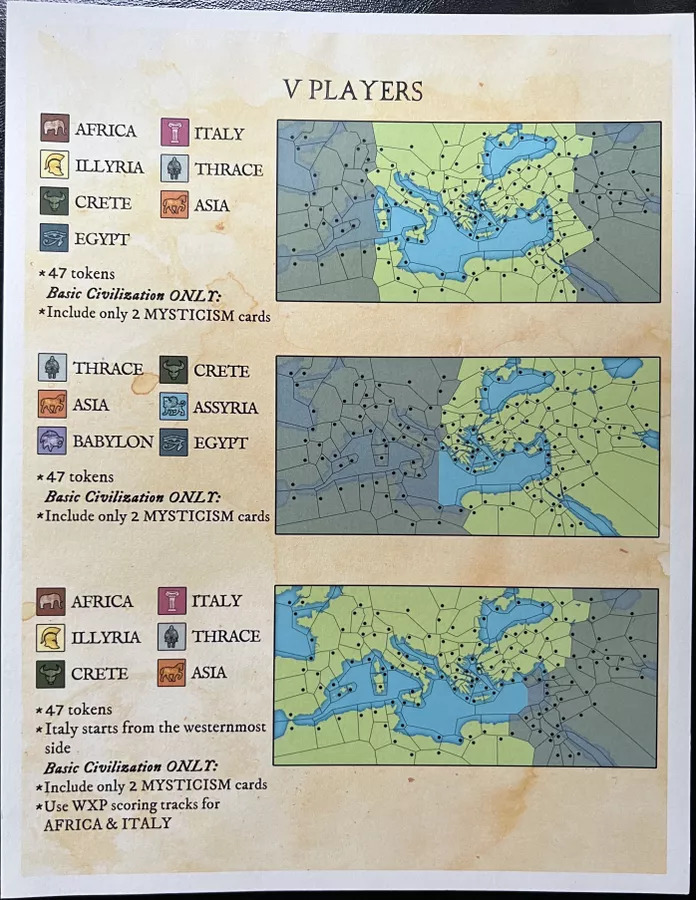
Civilization was released in the United Kingdon (UK) by Tresham’s own game company, Hartland Trefoil, in 1980. The game was successful enough in Britain that in 1982 war-gaming giant, Avalon Hill (AH), bought the copyright for the game and released a second edition in America and the UK.
The AH version was well received. The Dragon magazine review called the game “innovative and imaginative”. The reviewer added that the game defied comparison and he recommended it highly. Games International magazine said in 1990 that “Civilization is quite simply the best multi-player board game ever invented.” The 2007 book, Hobby Games: The 100 Best listed Civilization as one of the best 100 hobby games, alongside Risk and Allies & Axis. The game also sold well despite a hefty $22.00 dollar price tag (more than $70 dollars in 2024 dollars.)
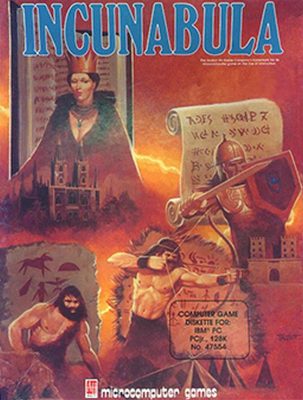
In 1984, Avalon Hill released the first video, or personal computer (PC), game version of Civilization called, Incunabula. (On a note, incunabula, Latin for “swaddling clothes”, are books or pamphlets printed before 1501.) Incunabula loosely followed the rules of Tresham’s game, but without the technology tree.
Computer Gaming World found the game to be “interesting and enjoyable” in multiplayer, but thought the solitaire mode would soon grow boring. The magazine also wondered about the name and said Avalon Hill should have just called it “Computer Civilization” (which would have saved a lot of legal wrangling down the road).
In 1991, now famed game designer Sid Meier and the MicroProse company released the PC game: Sid Meier’s Civilization (Civ I). Sid Meier later stated that he knew little about the board game, and he also added that it had not inspired, or influenced, the development of Civ I. But to be on the safe side, MicroProse had licensed the name, Civilization, from AH anyway.
(Read about the development of Civ I here: https://nodicenoglory.com/2022/08/08/retrospective-of-sid-meiers-civilization-i/ )
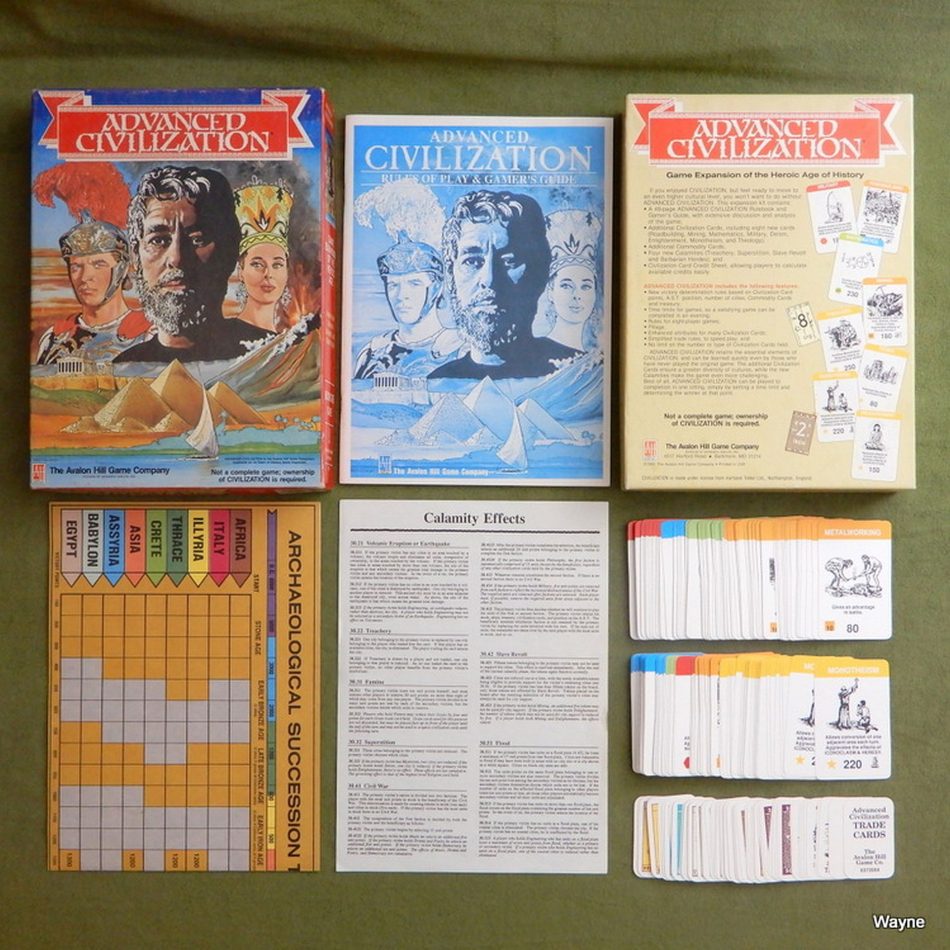
That same year AH released the Advanced Civilization expansion pack for the original Civilization board game. Advanced Civilization was not a stand-alone game, as it required a copy of the base game to play. The expansion was no harder to play than the base game. Advanced Civilization did rework some of the rules, added new resources and disasters to the trading cards and expanded the “tech tree”.
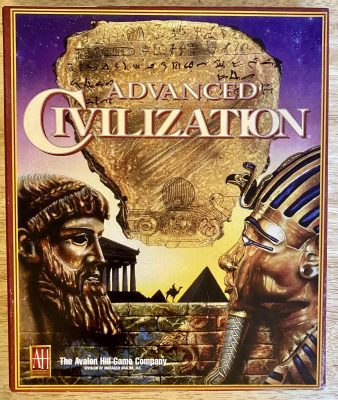
Most important Advanced Civilization rejiggered the advancement/victory conditions, making it easier for trailing players to catch up to leading players later in the game. Fan of the original game were of two minds about Advanced Civilization with some liking the new rules, and other disliking the changes intensely. Tresham did not think much of Advanced Civilization calling it “needless tinkering” with his design.
By 1995, Avalon Hill felt that the license to MicroProse of the Civilization trademark had lapsed and, in that year, AH released the PC version of Advanced Civilization called Avalon Hill’s Advanced Civilization. This game was a commercially flop, selling fewer than 20,000 units in three years.
Meanwhile, sales of Tresham’s original board game and AH’s Advanced Civilization expansion faltered and both were soon out of print. The last original edition printed version was published in 1993.
In 2018 Gibsons Games reprinted the original game. The reprint did not include the Advanced Civilization expansion, but did feature updated art and graphical design.
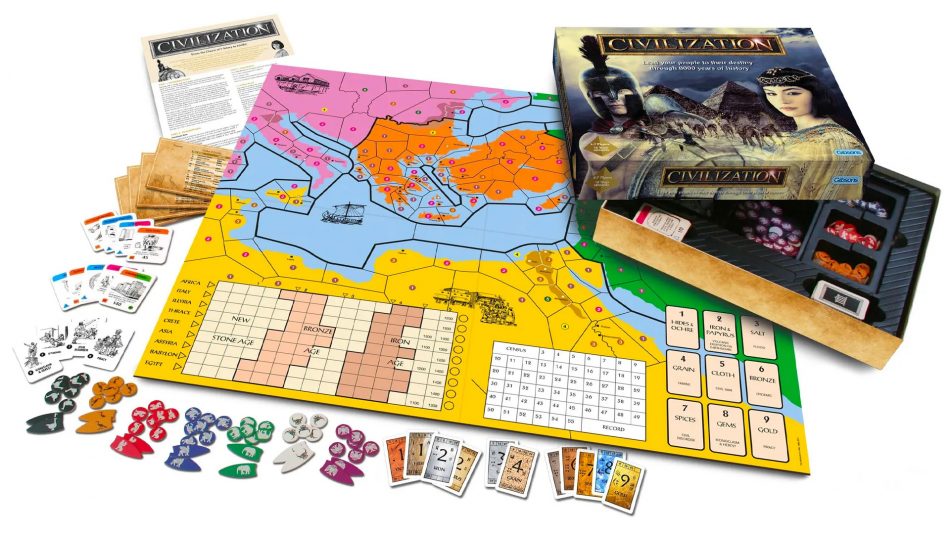
For those interested, the vintage copies of the Avalon Hill games are available on Ebay and other vintage game sites for between $100 and $200 dollars depending on condition.
The first Civilization board game introduced levels of depth and complexity to game design that were unique at the time its publication. The introduction of the “technology tree” alone has influenced countless subsequent board, card, and computer games. Further, the game’s emphasis on growth and development of a player’s faction rather than on war and conquest has also inspired aspects of multiple games of all kind. Civilization: the Board Game has left a permanent legacy on the gaming world.
Sources:
Boardgamegeek.com “Advanced Civilization”
________ Civilization (1980)
Computer Gaming World (Nov –Dec 1985). “Incunabula”.
_____ (April 1998). “READ.ME; Will the Real Civ Please Boot Up?”.
Dicebreaker.com (9 Sept. 2021) “The Civilization board game pioneered epic strategy a decade before Sid Meier”
Dragon (Feb. 1983). “The Dragon’s Augury“.
Games International (Jan. 1990). “Civilizing Influences”.
Game Studies (September 2012). “Technology Trees: Freedom and Determinism in Historical Strategy Games”
Hobby Games: The 100 Best. Edited by James Lowder (Seattle, WA: Green Ronin Pub.), 2007.
